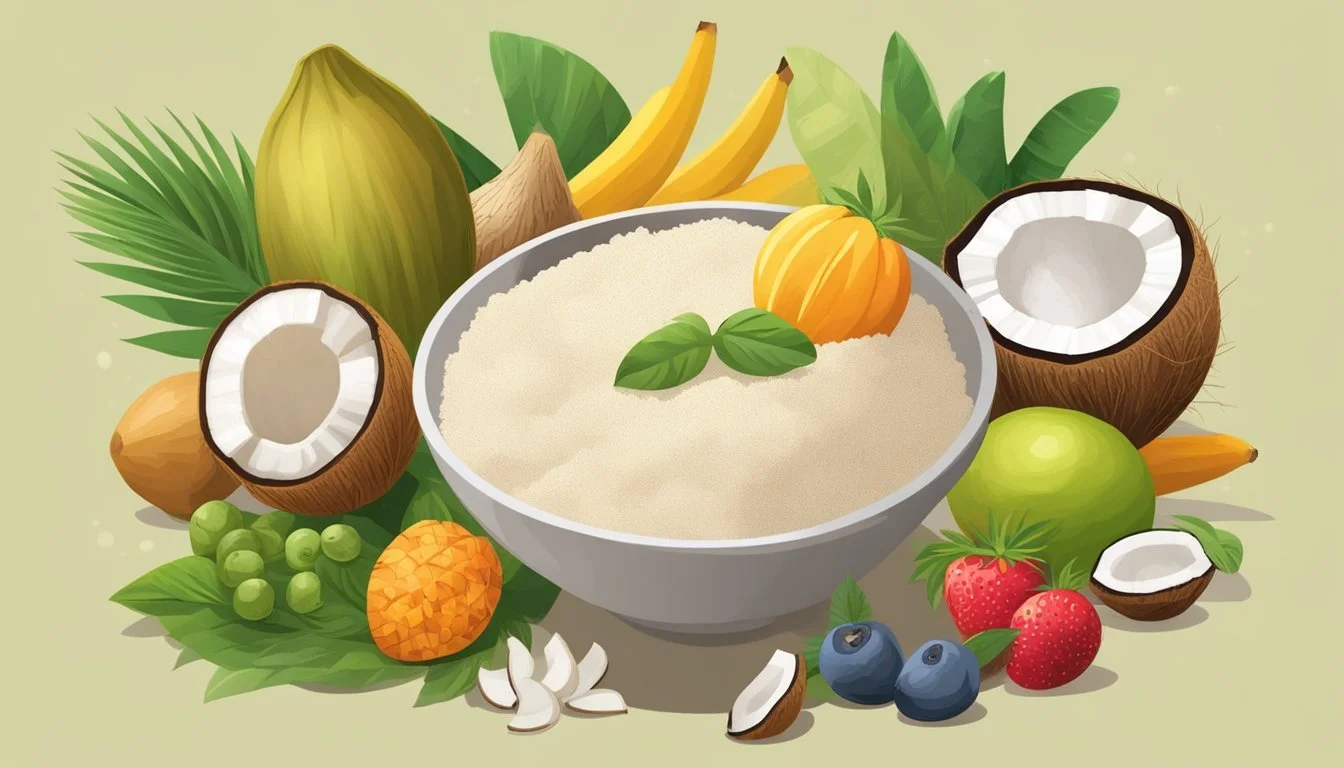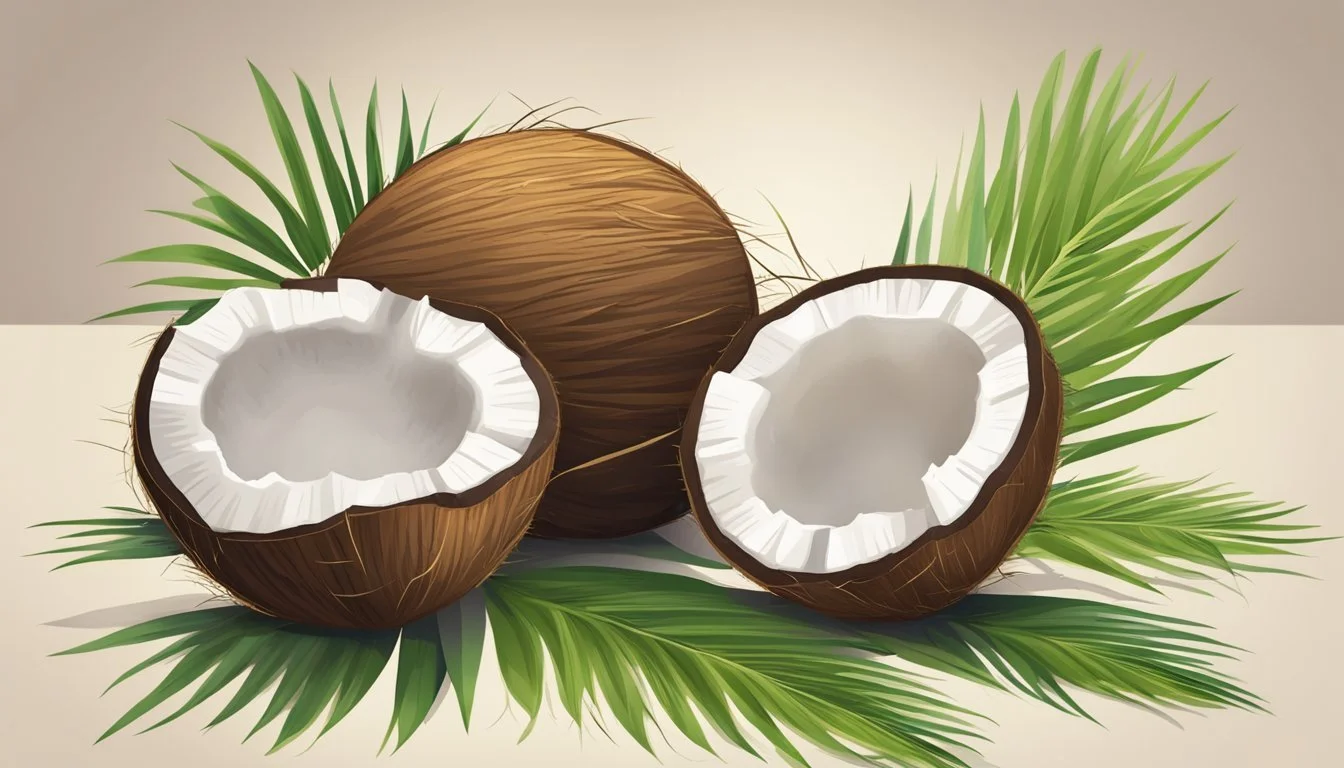Is Coconut Flour Vegan?
Unveiling The Facts About This Plant-Based Ingredient
Coconut flour is a popular ingredient among those who follow a plant-based diet. It is a natural byproduct of coconut milk production, made from dried and finely ground coconut meat, which inherently makes it vegan. As a flour substitute, coconut flour offers a gluten-free and protein-rich alternative for vegan baking. It's known for its high fiber content, low carbohydrate levels, and its ability to add a light, airy texture to baked goods when appropriately used.
Many vegans look to coconut flour as a staple in their pantries due to its versatility and nutritional benefits. It does not contain any animal products and thus suits the vegan criterion for plant-derived food sources. Coconut flour's absorbent qualities mean it requires an adjustment in the ratio of wet to dry ingredients in recipes, a consideration essential for successful vegan baking, especially when eggs—a common binder in traditional baking—are not being utilized.
However, the use of coconut flour in vegan baking does present challenges due to its unique properties. Unlike wheat flour, coconut flour has no gluten, which typically provides structure and elasticity in traditional baked goods. Vegan bakers often combine coconut flour with other vegan-friendly binding agents such as flaxseeds, chia seeds, or xanthan gum to achieve the desired texture in their culinary creations. Despite these challenges, coconut flour remains a favored choice for many looking for a nutritious, vegan-friendly baking ingredient.
What Is Coconut Flour?
Coconut flour is a product made from the dried meat of coconuts. It serves as a gluten-free, vegan-friendly alternative to traditional grain-based flours. Rich in nutrition, it is widely recognized for its unique properties in culinary applications.
Nutritional Profile
Coconut Flour is noted for its high fiber content, which contributes to a feeling of fullness and can aid in digestive health. Importantly, it is also:
Gluten-free: An ideal choice for those with gluten intolerances or celiac disease.
Vegan: Contains no animal products and is suitable for vegan diets.
Rich in protein: Contains more protein than conventional wheat flour, contributing to its nutritional value.
Low in sugar: Naturally lower in sugar, making it a preferable option for those monitoring their sugar intake.
High in fat: Contains more fat than other flours, with a composition that includes healthy fats.
Here is a brief nutritional breakdown for a typical serving of coconut flour:
Nutrient Amount per 100g Calories 400 kcal Protein 14-20g Carbohydrates 60-65g (of which fiber accounts for 35-40g) Fat 8-10g Water Trace amounts
Culinary Uses
Coconut flour is versatile in the kitchen due to its distinct texture and ability to absorb water. It is typically used in:
Baking: A partial substitute for wheat flour in recipes, due to its high absorbency. Generally, it should not exceed 20% of the total flour content without adjustments to other ingredients.
Thickening: Acts as a thickener in soups, sauces, and gravies.
Special diets: Its properties make it a staple in ketogenic, paleo, and other health-conscious diets.
The flour brings a mild coconut flavor to recipes that can either complement or enhance the taste profiles of various dishes. While it cannot replace wheat flour at a 1:1 ratio due to its high fiber content and unique texture, it's a favored component for those looking for a nutritious and sustainable flour alternative.
Health Benefits of Coconut Flour
Coconut flour, revered for its health benefits, is a high-fiber, gluten-free, low-carb, and grain-free alternative to conventional flours. This nutrient-dense flour is especially lauded for its positive impact on digestive health, its suitability for diabetic diets, and its role in weight management.
Digestive Health
Coconut flour is rich in dietary fiber, with a significant amount found in even a small serving. Fiber is known for its ability to support a healthy digestive system by promoting regular bowel movements and reducing the likelihood of constipation.
Suitability for Diabetic Diets
Given its low-carb profile, coconut flour is conducive to diabetic diets as it can help in moderating blood sugar levels post-consumption. Its fiber content aids in the slow release of glucose into the bloodstream, providing a more stable energy release compared to higher-glycemic flours.
Weight Management
The high fiber content of coconut flour not only aids in digestive health but also assists in weight management by promoting satiety. When consumed, it can help individuals feel full longer, which may lead to a natural reduction in calorie intake throughout the day.
Vegan Baking With Coconut Flour
Coconut flour offers a high-fiber, low-carb option for vegan bakers to create delicious, egg-free, and dairy-free goods. Due to its unique properties, one must consider appropriate substitutions, moisture balance, and methods to achieve fluffy textures when baking with coconut flour.
Making Substitutions
In vegan baking, coconut flour can replace traditional wheat flour, but it is not a 1:1 substitution. Coconut flour is highly absorbent, so you typically need to use less of it. Egg replacements are crucial since coconut flour usually requires a binding agent. Flax eggs, which are made from ground flax seeds mixed with water, are a common vegan substitute that can provide the binding that eggs would. Other viable substitutions include mashed bananas or applesauce, which can add to the moisture and help maintain the structure of the final product, such as in banana muffins.
Moisture and Absorbency
Coconut flour's absorbency necessitates an increase in liquids compared to other flours. Bakers should adjust recipes by adding more liquid ingredients—such as almond milk or water—to avoid a dry or crumbly outcome. In recipes where a liquid sweetener is used, this can also contribute to the overall moisture content. Additionally, "resting" the batter before baking allows the coconut flour to fully absorb the liquid, ensuring a better texture in the baked goods.
Creating Fluffy Textures
Achieving a light and fluffy texture with coconut flour can be challenging due to its density. To counteract this, bakers can incorporate ingredients that introduce air into the batter. Using baking powder, a leavening agent, helps baked goods rise and become airy. Vegan butter can be creamed with sugar to incorporate air pockets that expand during baking, contributing to a fluffier result. Lastly, carefully folding wet ingredients into dry ones can prevent overmixing, keeping the final product tender and light.
Coconut Flour Recipes and Tips
Coconut flour provides a gluten-free and paleo-friendly alternative for baking and cooking, suited for those adhering to a vegan lifestyle. Its high fiber and protein content make it a nutritious choice for a variety of dishes. When incorporating coconut flour in recipes, it's essential to remember that it's highly absorbent and using the correct liquid ratios is critical for desirable texture.
Breads and Muffins
For breads and muffins, one can mix coconut flour with ingredients like gluten-free flour, baking powder, and almond milk to maintain moisture. Vegan coconut flour pancakes can be enhanced with vanilla extract and sweetened with coconut sugar for a delicious breakfast option. To ensure the batter achieves the proper consistency, letting it rest may be necessary, as coconut flour continues to absorb liquid.
Example Recipe: Coconut Flour Banana Muffins
Ingredients: coconut flour, almond milk, baking powder, ripe bananas, vanilla extract
Tip: Let the batter rest for a few minutes to thicken before baking.
Cakes and Brownies
When baking cakes or brownies with coconut flour, its absorbent nature requires careful consideration of wet ingredients like almond milk or pureed fruits to balance dryness. Vegan recipes often suggest binding agents such as flax eggs to replace traditional eggs. For a flavorful and moist banana cake, one can blend ripe bananas and almond milk into the batter.
Example Recipe: Chocolate Coconut Flour Brownies
Ingredients: coconut flour, coconut sugar, cocoa powder, almond butter, flax eggs
Tip: Bake until just set to keep brownies moist.
Breakfast Items
Breakfast items such as waffles and pancakes are popular uses for coconut flour, giving a nutritious start to the day. Vegan coconut flour pancakes require consistency adjustments compared to traditional pancake batter. Mixing coconut flour with a variety of plant-based milks and sweeteners like maple syrup creates a dense yet satisfying texture.
Example Recipe: Vegan Coconut Flour Waffles
Ingredients: coconut flour, almond milk, baking powder, maple syrup, vanilla extract
Tip: Cook at a lower temperature than conventional waffles to prevent burning due to coconut flour’s unique properties.
Common Questions About Coconut Flour
Coconut flour is a popular vegan baking ingredient known for its high fiber content and gluten-free qualities. Proper measurement and storage are crucial for maintaining the flour's usability and nutritional value.
How to Measure
When measuring coconut flour, accuracy is essential due to its unique properties. One should use the "spoon and level" method: spoon the coconut flour into a measuring cup and level it off with a straight edge. Avoid packing the flour down into the cup as this can lead to using too much, making baked goods dry or dense. For substitution, every cup of wheat flour can be replaced with about 1/4 to 1/3 cup of coconut flour, due to its high absorbency.
Shelf Life and Storage
To maximize shelf life, one must store coconut flour properly. Keep it in an airtight container or sealed bag to prevent moisture or pests from getting in. For optimal freshness, storage in a cool, dry place is recommended, while refrigeration or freezing can extend its shelf life even further. Typically, when stored correctly, coconut flour can last up to 6 months in the pantry and up to a year or more in the freezer.
Conclusion
Coconut flour is inherently vegan, making it a suitable option for those adhering to a plant-based diet. Its vegan status stems from its sole ingredient: dried and ground coconut meat. Individuals can integrate this high-fiber, nutrient-dense flour into a multitude of recipes, providing a distinct flavor and contributing to a balanced nutritional profile within vegan cuisine.
When selecting coconut flour, consumers should be mindful of specific brand practices. Transparency in sourcing and production methods can ensure that the product aligns with the ethical standards often associated with veganism. Environmental considerations, such as sustainability and the carbon footprint of transportation, are equally important factors for consumers dedicated to eco-conscious living.
Key Points:
Coconut flour is 100% vegan.
A boon for gluten intolerance, as it is naturally gluten-free.
Rich in dietary fiber and low in carbohydrates.
Appropriate for a range of recipes like pancakes, shortbread, and other baked goods.
Eco-conscious consumers should investigate the brand's sustainability efforts.
Incorporating coconut flour into one’s diet can align with vegan principles, provided that due diligence is exercised with respect to brand choice and environmental impact.






